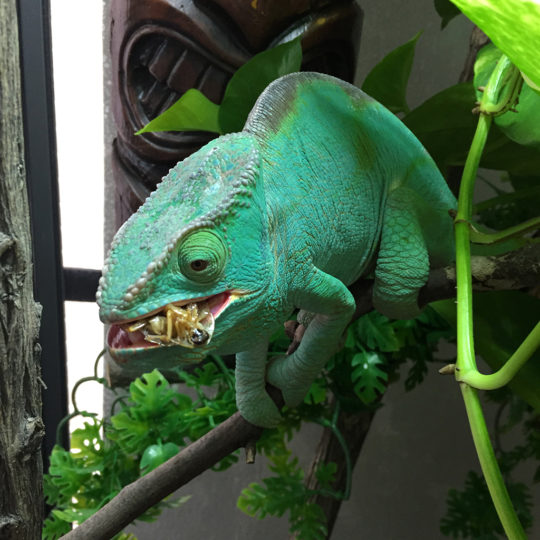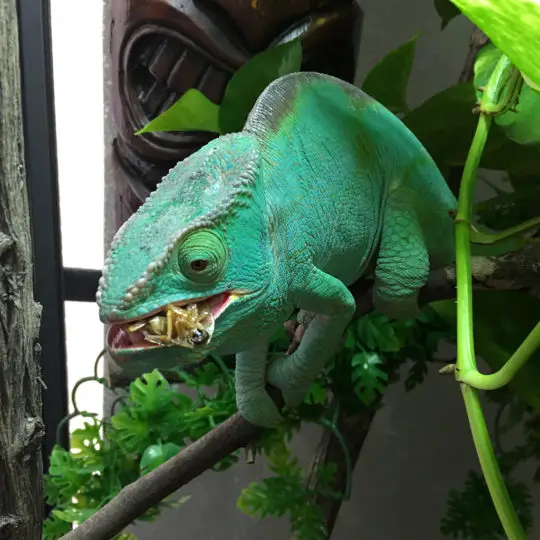Are you a proud owner of a chameleon but confused about how often to feed it? Don’t worry, you’re not alone! It’s a common question among chameleon owners, and the answer depends on various factors such as age, size, and species of your chameleon.
A proper diet is crucial for your chameleon’s health and well-being. Overfeeding or underfeeding can lead to health issues and even death. Therefore, it’s crucial to understand the feeding requirements of your chameleon. In this article, we’ll discuss everything you need to know about how often to feed your chameleon to ensure it stays healthy and happy.

How Often Should I Feed My Chameleon?
Chameleons are fascinating creatures that require a lot of care and attention. One of the most important aspects of their care is their diet. As an owner, it’s important to know how often to feed your chameleon to ensure they stay healthy and happy. In this article, we’ll discuss how often you should feed your chameleon and what factors can affect their feeding schedule.
Factors Affecting Feeding Schedule
The feeding schedule of your chameleon depends on several factors, including their age, size, and species. Young chameleons require more frequent feedings than adults, while larger chameleons require larger prey items. Additionally, different species of chameleons have different dietary requirements, so it’s important to research your specific species to determine their feeding schedule.
Another factor that can affect the feeding schedule is the temperature and lighting in their enclosure. Chameleons require specific temperatures and lighting to digest their food properly, so it’s important to ensure their enclosure is set up correctly.
Feeding Schedule for Juvenile Chameleons
Juvenile chameleons require more frequent feedings than adults. They should be fed every day or every other day, depending on their size and species. It’s important to offer them a variety of prey items, including crickets, mealworms, and waxworms. You can also offer them small slices of fruits and vegetables, such as strawberries or carrots.
Feeding Schedule for Adult Chameleons
Adult chameleons require fewer feedings than juveniles. They should be fed every 2-3 days, depending on their size and species. It’s important to offer them a variety of prey items, including crickets, roaches, and hornworms. You can also offer them larger slices of fruits and vegetables, such as apples or carrots.
Benefits of a Proper Feeding Schedule
Providing your chameleon with a proper feeding schedule has many benefits. It ensures they are getting the nutrients they need to stay healthy and active. It can also help prevent obesity and other health issues that can arise from overfeeding. Additionally, a proper feeding schedule can help maintain their natural behavior and prevent stress.
Overfeeding vs. Underfeeding
Overfeeding and underfeeding can both have negative effects on your chameleon’s health. Overfeeding can lead to obesity and other health issues, while underfeeding can lead to malnutrition and decreased activity levels. It’s important to find the right balance and feed your chameleon according to their specific needs.
Conclusion
In conclusion, the feeding schedule of your chameleon depends on several factors, including their age, size, and species. It’s important to research your specific species to determine their feeding schedule and provide them with a variety of prey items. A proper feeding schedule can have many benefits and help prevent health issues. Remember to find the right balance and feed your chameleon according to their specific needs.
Frequently Asked Questions
How often should I feed my chameleon?
Chameleons are known for their unique dietary needs, and it’s important to make sure you’re feeding them the right amount. How often you should feed your chameleon depends on their age and size. Generally, adult chameleons should be fed every other day, while juveniles should be fed daily.
It’s also important to consider the type of food you’re feeding your chameleon. Insects should always be gut-loaded (fed a nutritious diet) before being fed to your chameleon. Make sure to provide a variety of different insects to ensure your chameleon is getting a balanced diet. It’s also a good idea to dust the insects with a calcium supplement to prevent metabolic bone disease.
How much should I feed my chameleon?
The amount of food your chameleon needs also depends on their size and age. A good rule of thumb is to feed your chameleon as many insects as they can eat in a 10-15 minute period. Once they’ve finished eating, remove any uneaten insects from their enclosure to prevent them from becoming stressed or escaping.
It’s important not to overfeed your chameleon, as this can lead to obesity and other health problems. If you’re unsure how much to feed your chameleon, consult with a veterinarian or reptile specialist.
What should I feed my chameleon?
Chameleons require a diet that is high in protein and low in fat. The majority of their diet should consist of insects, such as crickets, mealworms, and waxworms. It’s important to provide a variety of different insects to ensure your chameleon is getting all the nutrients they need.
In addition to insects, chameleons may also eat small amounts of fruits and vegetables. However, these should only make up a small portion of their diet, as chameleons are primarily insectivores.
Can I feed my chameleon live insects?
Yes, chameleons should always be fed live insects. This is because they are natural hunters and require movement to stimulate their hunting instincts. However, it’s important to make sure the insects are the appropriate size for your chameleon, as larger insects can pose a choking hazard.
It’s also important to make sure the insects are healthy and free from parasites before feeding them to your chameleon. Gut-loading the insects with a nutritious diet and dusting them with a calcium supplement can also help ensure your chameleon is getting the nutrients they need.
Should I feed my chameleon at night?
No, chameleons should not be fed at night. This is because they are diurnal (active during the day) and require a period of rest at night. Feeding your chameleon at night can disrupt their sleep and lead to health problems.
Instead, it’s best to feed your chameleon in the morning or early afternoon, when they are most active. This will allow them to digest their food properly and ensure they get the nutrients they need to stay healthy.
What is the best time to feed a chameleon?
In conclusion, the frequency of feeding your chameleon largely depends on its age, size, and overall health. Younger chameleons require more frequent feedings, while adults can be fed less often. It is important to provide a variety of insects and occasional fruits to ensure a balanced diet for your chameleon.
It is also crucial to pay attention to your chameleon’s behavior and appetite. If your chameleon is not eating regularly or appears lethargic, it may be a sign of an underlying health issue. In such cases, it is best to consult a veterinarian who specializes in reptiles.
Lastly, always ensure that you are providing a clean and appropriate environment for your chameleon. A clean enclosure with proper temperatures and lighting can help promote healthy digestion and appetite. By following these guidelines, you can ensure that your chameleon stays healthy and happy for years to come.


